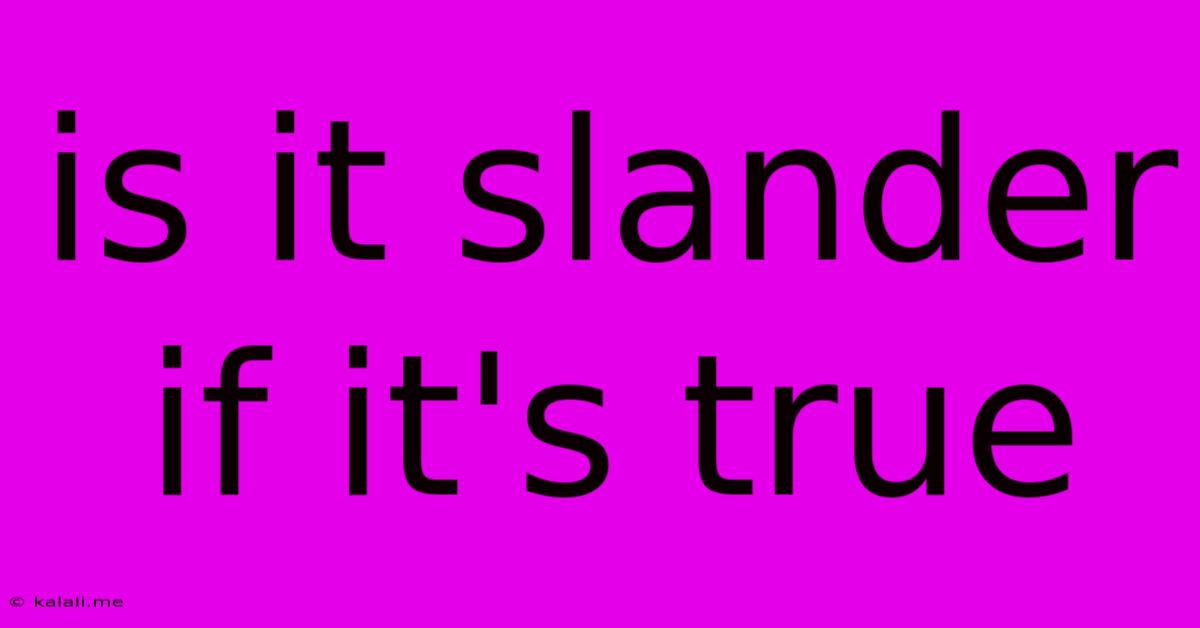Is It Slander If It's True
Kalali
Jun 07, 2025 · 3 min read

Table of Contents
Is It Slander if It's True? Understanding Truth as a Defense in Defamation Cases
The question of whether something constitutes slander if it's true is a crucial one in understanding defamation law. While many believe that speaking the truth, no matter how damaging, is always permissible, the reality is more nuanced. This article explores the complex relationship between truth, slander, and the legal defenses available.
What is Slander?
Slander is a form of defamation, specifically oral defamation. Defamation is the act of making a false statement about someone that harms their reputation. To successfully sue for slander, a plaintiff must prove:
- A false statement of fact: Opinions, jokes, or statements that are clearly hyperbolic generally aren't considered defamation.
- Publication to a third party: The statement must have been communicated to someone other than the person being defamed.
- Fault: The defendant must have acted negligently or with actual malice (knowing it was false or with reckless disregard for the truth).
- Damages: The plaintiff must show that the statement harmed their reputation and caused them damages, such as lost income or emotional distress.
Truth as an Absolute Defense
In most jurisdictions, truth is an absolute defense against a claim of slander or libel (written defamation). This means that if a statement, however damaging, is factually accurate, it cannot be considered defamation, regardless of intent. This principle is fundamental to free speech and the protection of the public's right to access accurate information.
The Importance of Proving Truth
While truth is a strong defense, it's not always easy to prove. The burden of proof rests on the defendant to demonstrate the truthfulness of the statement. This often involves presenting substantial evidence, such as documents, witness testimony, or expert opinions, to support their claim. The level of proof required can vary depending on the jurisdiction and the specific circumstances of the case.
Nuances and Challenges
Even with a truthful statement, several complexities can arise:
- Context and Innuendo: A statement might be factually true but presented in a way that creates a false impression through innuendo or suggestive language. This can still be considered defamatory.
- Partial Truth: A statement that is partially true but omits crucial context that alters its meaning can also be considered defamatory. The omission of relevant information can create a misleading impression.
- Privilege: Certain individuals, such as journalists or those involved in legal proceedings, might enjoy qualified privilege, which protects them from defamation lawsuits even if the statement is partially untrue, provided it is made without malice and in good faith.
Conclusion
While truth is generally a complete defense against slander, navigating the legal complexities of defamation requires careful consideration of context, intent, and the burden of proof. The line between truthful reporting and defamatory statements can be blurry. If you are considering making a statement that could potentially be damaging to someone's reputation, consulting with a legal professional is crucial to avoid unintended consequences. The information presented here is for educational purposes and not legal advice. It is essential to seek professional legal counsel for advice regarding specific situations.
Latest Posts
Latest Posts
-
Unclean And Clean Animals In The Bible
Jun 07, 2025
-
Whats A Good Weapon Accuracy In Overwatch
Jun 07, 2025
-
How To Paint Parking Lot Lines
Jun 07, 2025
-
Good Pokemon Teams For X And Y
Jun 07, 2025
-
Who Killed Rize In Tokyo Ghoul
Jun 07, 2025
Related Post
Thank you for visiting our website which covers about Is It Slander If It's True . We hope the information provided has been useful to you. Feel free to contact us if you have any questions or need further assistance. See you next time and don't miss to bookmark.